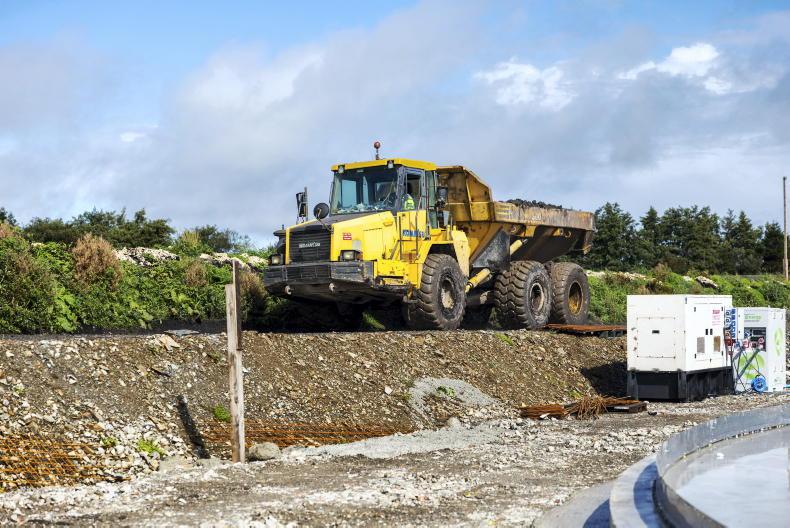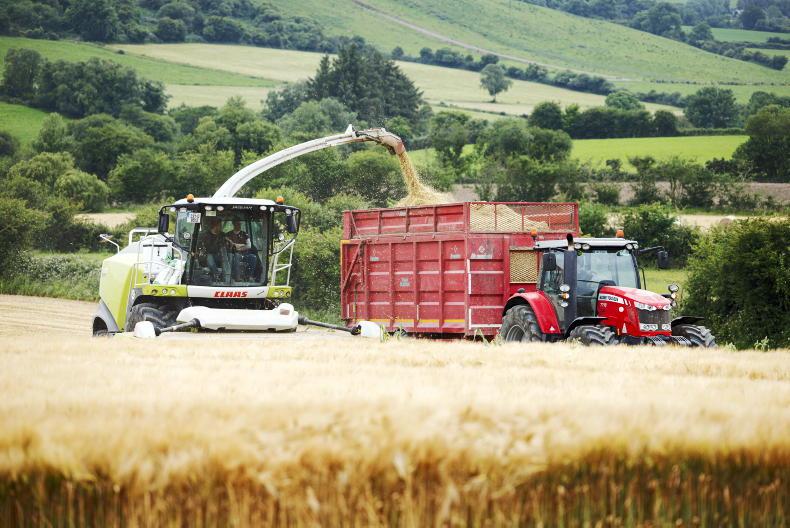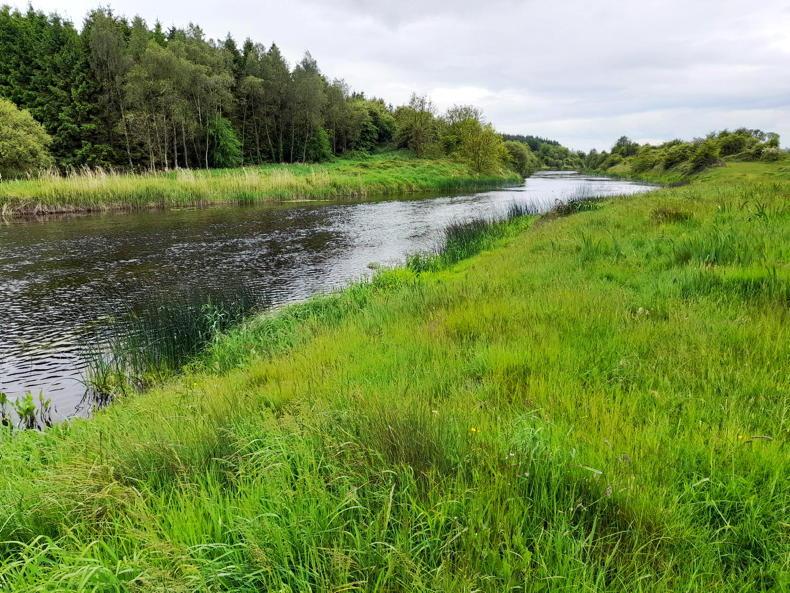In October 2024, 15 members of the Fertilizer Association of Ireland (FAI) visited Carbery’s Farm Zero C site at Shinagh Farm, Bandon, Co Cork, to explore sustainable farming practices – the site is part of the larger BiOrbic Bioeconomy Research Centre. Hosts Mary Kate Doherty, Farm Zero C, and Don Crowley, Teagasc adviser, Clonakilty, detailed efforts to reduce emissions and improve sustainability. Since 2018, the Shinagh Farm has cut its life cycle assessment (LCA) emissions by 27%, with 73% of 2023 emissions stemming from animal digestion, and 8% each from manure management, fertiliser use, and feed production.
Shinagh Farm – established in 2011 by Carbery, Shinagh Estates, and supported by Teagasc – milks 242 cows, producing 458kg of milk solids per cow annually. It spans 107ha, with a whole farm organic nitrogen loading of 219kg/ha. Kevin Ahern, farm manager since its inception, has reduced synthetic fertiliser use by 54% since 2018, aided by the establishment of white clover and multispecies swards, resulting in the supply of N through biological N fixation.
The farm is in the process of trialling Bovaer, a methane-reducing feed additive, achieving a 5% reduction in emissions. Soil health is prioritised, with 70% of the land area with a soil pH above 6.5, 79% at phosphorus index 3+ and 84% at potassium index 3+. Efforts to enhance on-farm biodiversity have led to an increase in the area under natural habitats from 7.5% to 10% since 2011, and this is being tracked by utilising satellite imagery. Looking ahead, Shinagh Farm plans a 2025 biorefinery and anaerobic digestion (AD) unit to process grass into cattle feed, biomethane and protein concentrates, funded by recent grants.
The tour highlighted innovative practices taking place within Shinagh Farm and the Farm Zero C project, including challenges with managing fertiliser applications and clover management within the grassland swards. The FAI members in attendance gained valuable insights into balancing productivity targets with environmental stewardship, thanks to the comprehensive presentations and in-depth tour of the farm.
Northern Ireland tour
The autumn 2024 study tour took place in Northern Ireland on 8-9 October, and focused on anaerobic digestion (AD) and manure management. This initiative aligned with the publishing of Ireland’s National Biomethane Strategy, providing participants with insights into sustainable farming practices.
The first day began at the Agri-Food and Biosciences Institute (AFBI) in Hillsborough. Attendees explored long-term fertiliser trials, the GrassCheck plots, red-clover silage fields, and the AD research plant demonstrating manure management techniques.
FAI members visited the bespoke manure emissions research facility at AFBI Hillsborough, where the effectiveness of slurry amendments for reducing emissions were being evaluated.
In the final indoor session, water quality issues in Lough Neagh and the Upper Bann were presented and discussed. The ongoing investigations into the causes of the water quality problems in the lough, highlighted the risks of P loss to water bodies from soils with high phosphate levels and the effect of an invasive species in the lough, leading to eutrophication. The FAI members in attendance heard that the achievement of acceptable water quality could take up to 40 years, as phosphate draw-down from soils is a very slow process.
The second day of this study tour featured visits to two farms operating AD plants. At Alastair Taylor’s farm in Co Antrim, AD technology integrates with fully automated dairy and poultry production systems on the farm.
The 150 kW AD plant processes the slurry and manure produced on the farm, generating biogas, which is used to generate power and heat for farm operations and additional income through electricity sales. On the Hunniford family farm in Co Armagh, their transition from tillage and beef farming enterprises to incorporate a waste management operation was discussed.
On the farm imported wastes are processed in AD plants. They aim to tackle the phosphate challenges by developing post-processing of the digestate produced, by separation into liquid and solid fractions.
The future aim is to pelletise the solids at a concentrated source of P nutrient and to treat the liquid to a potable water standard.
A new grain- drying facility will utilise the excess heat from the combined power and heat generated from the biomethane produced in the AD plant.
Participants gained insights into the potential role for AD plants in sustainable farming systems, including the mitigation of GHG emissions and increasing energy efficiency.
The FAI’s autumn study concluded with final reflections from the members and gratitude to organisers for a very interesting and informative couple of days.

Biomass trials at AFBI Hillsborough.
In October 2024, 15 members of the Fertilizer Association of Ireland (FAI) visited Carbery’s Farm Zero C site at Shinagh Farm, Bandon, Co Cork, to explore sustainable farming practices – the site is part of the larger BiOrbic Bioeconomy Research Centre. Hosts Mary Kate Doherty, Farm Zero C, and Don Crowley, Teagasc adviser, Clonakilty, detailed efforts to reduce emissions and improve sustainability. Since 2018, the Shinagh Farm has cut its life cycle assessment (LCA) emissions by 27%, with 73% of 2023 emissions stemming from animal digestion, and 8% each from manure management, fertiliser use, and feed production.
Shinagh Farm – established in 2011 by Carbery, Shinagh Estates, and supported by Teagasc – milks 242 cows, producing 458kg of milk solids per cow annually. It spans 107ha, with a whole farm organic nitrogen loading of 219kg/ha. Kevin Ahern, farm manager since its inception, has reduced synthetic fertiliser use by 54% since 2018, aided by the establishment of white clover and multispecies swards, resulting in the supply of N through biological N fixation.
The farm is in the process of trialling Bovaer, a methane-reducing feed additive, achieving a 5% reduction in emissions. Soil health is prioritised, with 70% of the land area with a soil pH above 6.5, 79% at phosphorus index 3+ and 84% at potassium index 3+. Efforts to enhance on-farm biodiversity have led to an increase in the area under natural habitats from 7.5% to 10% since 2011, and this is being tracked by utilising satellite imagery. Looking ahead, Shinagh Farm plans a 2025 biorefinery and anaerobic digestion (AD) unit to process grass into cattle feed, biomethane and protein concentrates, funded by recent grants.
The tour highlighted innovative practices taking place within Shinagh Farm and the Farm Zero C project, including challenges with managing fertiliser applications and clover management within the grassland swards. The FAI members in attendance gained valuable insights into balancing productivity targets with environmental stewardship, thanks to the comprehensive presentations and in-depth tour of the farm.
Northern Ireland tour
The autumn 2024 study tour took place in Northern Ireland on 8-9 October, and focused on anaerobic digestion (AD) and manure management. This initiative aligned with the publishing of Ireland’s National Biomethane Strategy, providing participants with insights into sustainable farming practices.
The first day began at the Agri-Food and Biosciences Institute (AFBI) in Hillsborough. Attendees explored long-term fertiliser trials, the GrassCheck plots, red-clover silage fields, and the AD research plant demonstrating manure management techniques.
FAI members visited the bespoke manure emissions research facility at AFBI Hillsborough, where the effectiveness of slurry amendments for reducing emissions were being evaluated.
In the final indoor session, water quality issues in Lough Neagh and the Upper Bann were presented and discussed. The ongoing investigations into the causes of the water quality problems in the lough, highlighted the risks of P loss to water bodies from soils with high phosphate levels and the effect of an invasive species in the lough, leading to eutrophication. The FAI members in attendance heard that the achievement of acceptable water quality could take up to 40 years, as phosphate draw-down from soils is a very slow process.
The second day of this study tour featured visits to two farms operating AD plants. At Alastair Taylor’s farm in Co Antrim, AD technology integrates with fully automated dairy and poultry production systems on the farm.
The 150 kW AD plant processes the slurry and manure produced on the farm, generating biogas, which is used to generate power and heat for farm operations and additional income through electricity sales. On the Hunniford family farm in Co Armagh, their transition from tillage and beef farming enterprises to incorporate a waste management operation was discussed.
On the farm imported wastes are processed in AD plants. They aim to tackle the phosphate challenges by developing post-processing of the digestate produced, by separation into liquid and solid fractions.
The future aim is to pelletise the solids at a concentrated source of P nutrient and to treat the liquid to a potable water standard.
A new grain- drying facility will utilise the excess heat from the combined power and heat generated from the biomethane produced in the AD plant.
Participants gained insights into the potential role for AD plants in sustainable farming systems, including the mitigation of GHG emissions and increasing energy efficiency.
The FAI’s autumn study concluded with final reflections from the members and gratitude to organisers for a very interesting and informative couple of days.

Biomass trials at AFBI Hillsborough.











SHARING OPTIONS